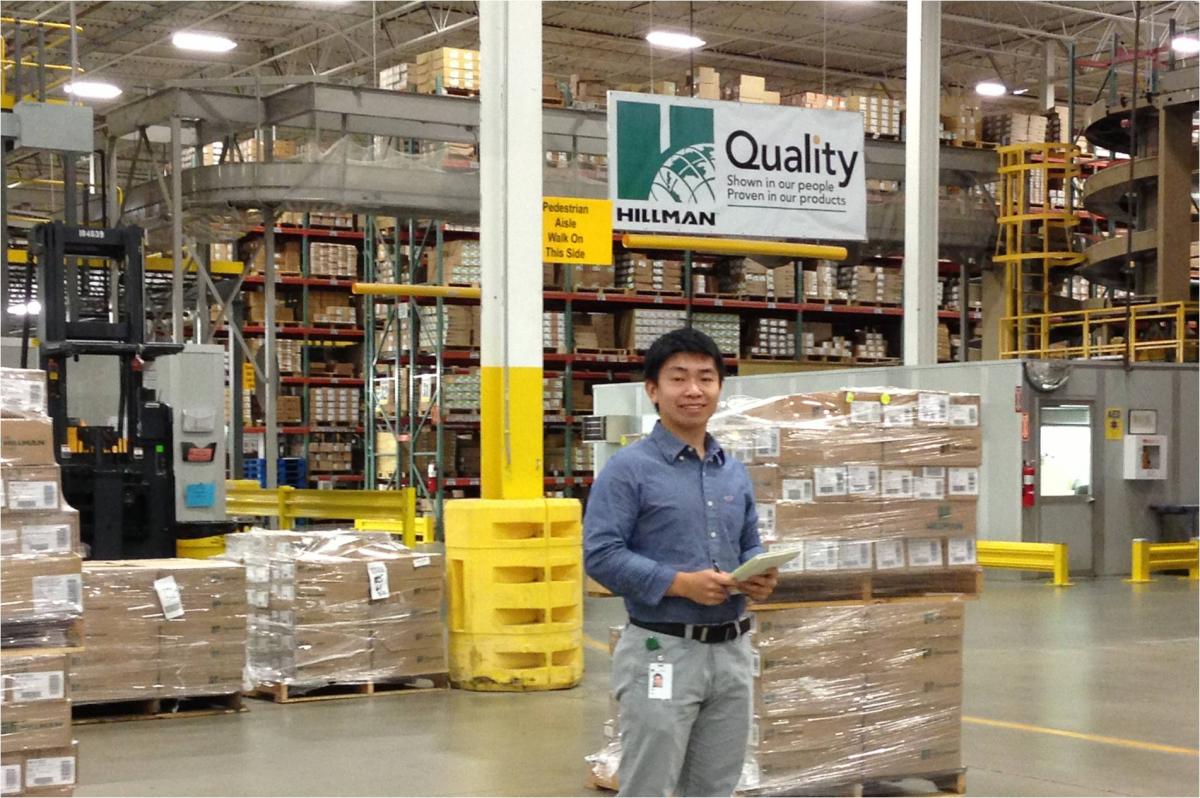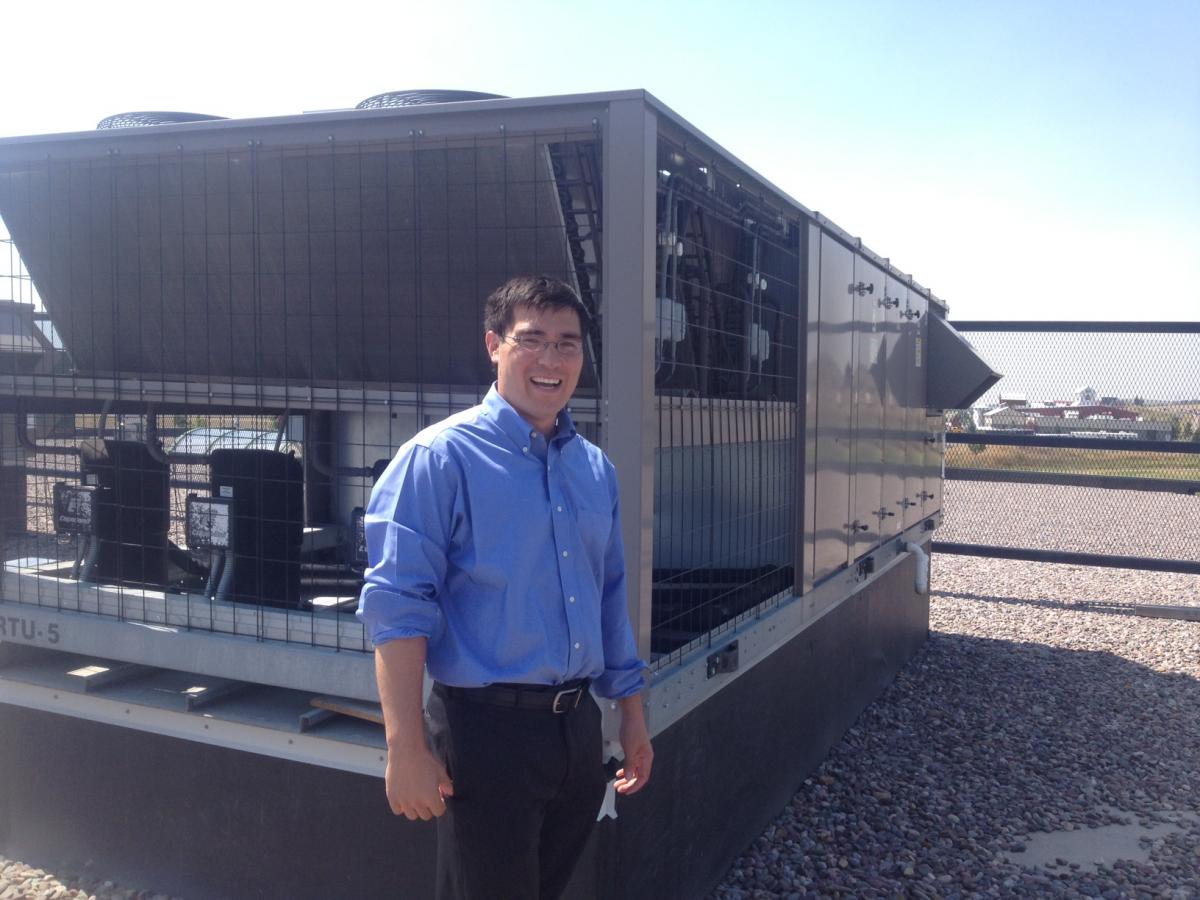EDF Climate Corps fellow | September 16, 2013
That’s where three EDF Climate Corps fellows from Duke University found themselves this summer. Read below to learn about Gary, Kara and Daniel and how they spent their summers working within organizations to further energy management. If you’d like to become a part of the growing EDF Climate Corps Network as either a fellow or host organization for summer 2014, our applications are now available!

Name: Gary Gao
Hometown: Mountain View, California
School: Duke University
Host Organization: The Hillman Group
Q: What is one interesting fact about you?
A: I started out studying biology and soil science; now I’m in energy. I originally thought all of our problems could be solved through science, and we just needed to keep pushing the boundaries of our knowledge. Eventually, I realized that science is only part of the puzzle; communication with businesses and the government can have a large impact in solving our current global issues. That’s why I transitioned to energy, to learn more about the nexus of science, business and policy.
Q: What are you working on this summer?
A: My main goal is improving the two facilities in the Cincinnati area. The first facility is the Hillman headquarters, which is unique in that it is a combination of office and warehouse. The second facility is the distribution center, about five minutes away. The two facilities have already undergone a lot of lighting upgrades, so I have been focusing on HVAC (heating, ventilation and air conditioning) opportunities and improving control through a building management system.
Q: What is the most difficult part about tackling this project?
A: The most challenging part is calculating HVAC system savings. There are a lot of variables in HVAC calculations that can change the result significantly. It involves a lot more physics and modeling than say a lighting project. With these buildings, the HVAC factors are much more complex.
Q: What is one thing you have learned this summer?
A: One thing I’ve learned is talk to everybody - especially the people who have worked here a long time. There are a lot of things you can’t see in the data. Insider knowledge makes it easier to find opportunities for improvement, especially when there isn’t a lot of data.
Q: What was your first day like at The Hillman Group?
A: My first day was very calm and chaotic at the same time. The distribution center was offline for the day due to an unplanned power outage, something that’s never happened before. The maintenance staff was busy getting operations back online, while the usually bustling warehouse remained quiet and deserted. It was an interesting time meeting everyone in a time of crisis, and I learned a lot in the first day from that experience.

Name: Kara Jones
Hometown: Olathe, KS
School: Duke University
Host Organization: Mack Trucks
Q: What are you working on this summer?
A: The Mack Trucks facility I am working in is in the process of implementing an energy management system and verifying energy performance improvements from the last 10 years. I am gathering and analyzing data to confirm the improvements and am investigating future projects to reduce the energy used for lighting offices and locker rooms.
Q: In tackling the lighting projects, what has been the most difficult part?
A: The most difficult part has been gathering all the data. The last full assessment of office lighting was in 2006. I have done my best to inventory close to 100,000 square feet of space and piece together past records and vendor assessments.
Q: What is one thing you’ve learned this summer?
A: My perspective coming in was from an organization-wide level. I’ve gotten great insight into the unique considerations of a single facility by working with employees responsible for energy on the shop floor.
Q: What has been the best part about working at Mack Trucks?
A: It’s been really exciting to be able to get that inside look. The production process is complex and quite fascinating. Also, the facility will soon achieve Superior Energy Performance certification, for which I previously supported the design while working for the U.S. Department of Energy.
Q: What is the mark you want to leave on the world?
A: My career is focused on contributing to a circular economy. Rather than relying on linear designs of resource extraction, use and disposal, I want to help our society create loops that bring resources currently wasted back around to productive use.

Name: Daniel Chow
Hometown: Scarsdale, NY
School: Duke University
Host Organization: DIRECTV, INC.
Q: Why did you join EDF Climate Corps?
A: Mainly because I’m really interested in energy efficiency as a very bipartisan and logical first step towards reducing our impact as businesses.
Q: What are some of the projects you’re working on?
A: I’ve been traveling to DIRECTV call centers to deliver “Green Team” trainings. As part of that, I’m meeting with the employees that are responsible for developing a grass roots movement at the company. I’ve also been looking at the potential for renewable energy at the call centers, looking at the incentives and costs and then making recommendations.
Q: What is one thing you’ve learned this summer?
A: I’ve learned a lot more about solar and renewables. Specifically, I’ve had the time to look into how the tax benefits function to incentivize different financing options depending on a company’s finances. I’ve also gotten the feel for how a big organization works, how it’s structured and divided.
Q: What has been the best part about working at DIRECTV?
A: I love that they give me the freedom to make my suggestions and then listen to them. I feel respected as a piece of the team, which doesn’t always happen in summer engagements.
Q: What is the mark you want to leave on the world?
A: I would like to work to change the mindset of people to move away from short term gains, toward a longer view. Thinking with long term goals in mind is really important in changing how costs and benefits are looked at.
This post is a part of our "Interviews with Tomorrow's Leaders" series. Stay tuned for more interviews with our 2013 EDF Climate Corps fellows!
About EDF Climate Corps
EDF Climate Corps (edfclimatecorps.org) taps the talents of tomorrow’s leaders to save energy, money and the environment by placing specially-trained EDF fellows in companies, cities and universities as dedicated energy problem solvers. Working with hundreds of leading organizations, EDF Climate Corps has found an average of $1 million in energy savings for each participant. For more information, visit edfclimatecorps.org. Read our blog at edfclimatecorps.org/blog. Follow us on Twitter at twitter.com/edfbiz and on Facebook at facebook.com/EDFClimateCorps.